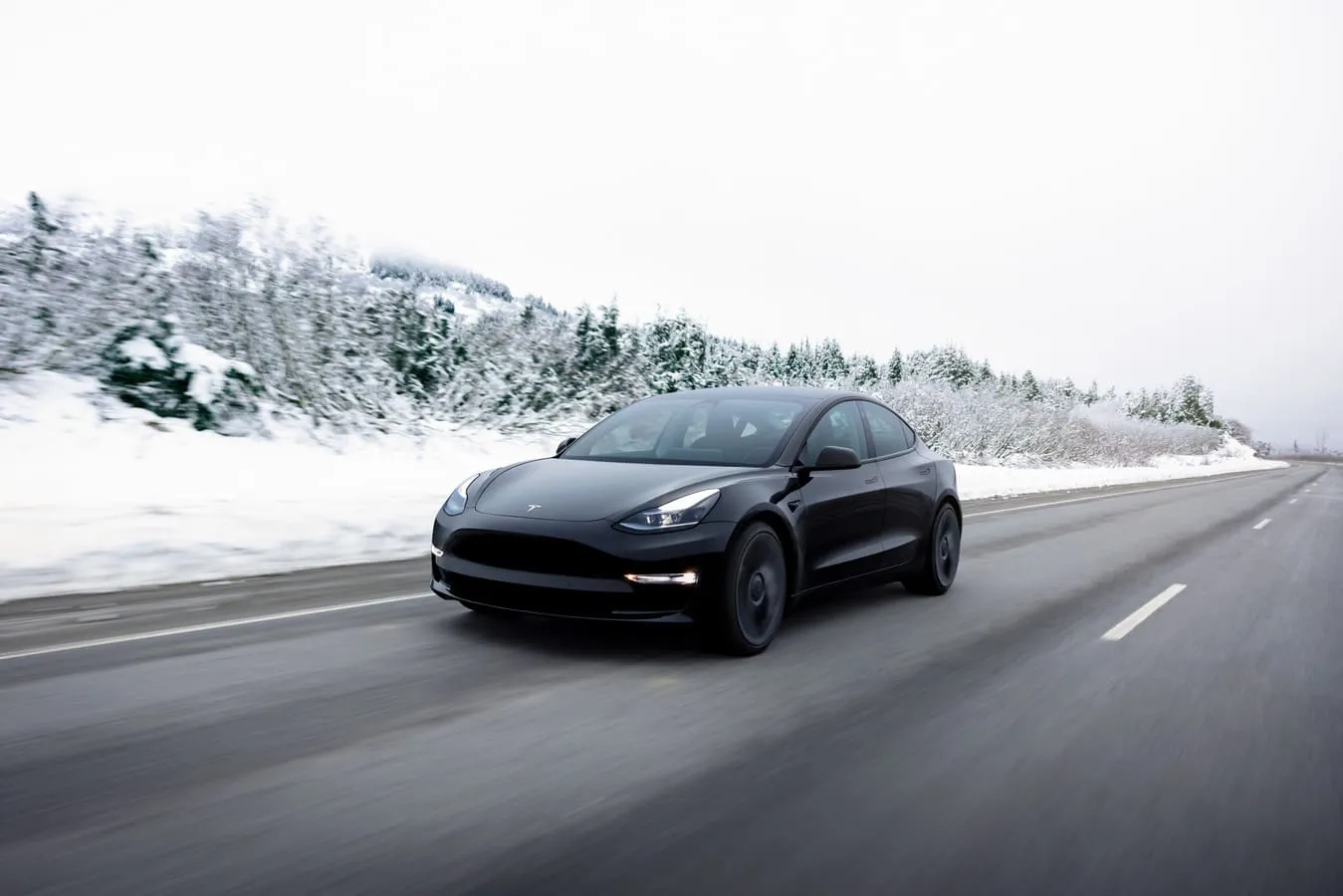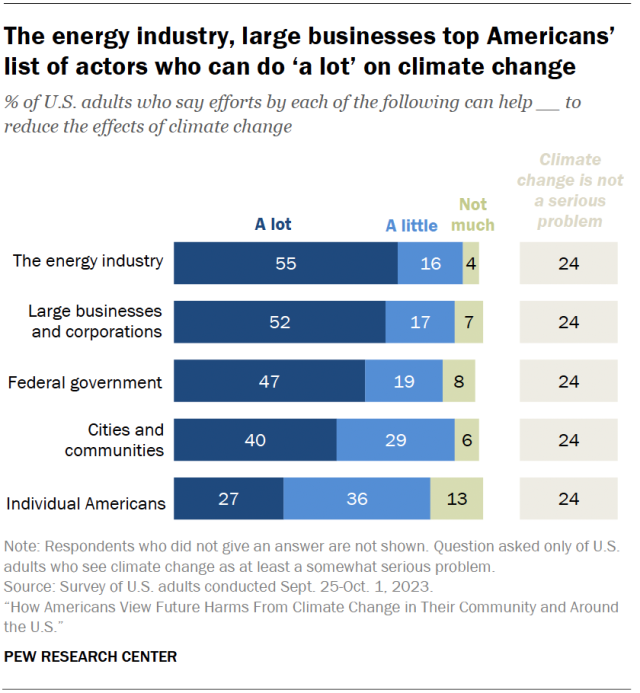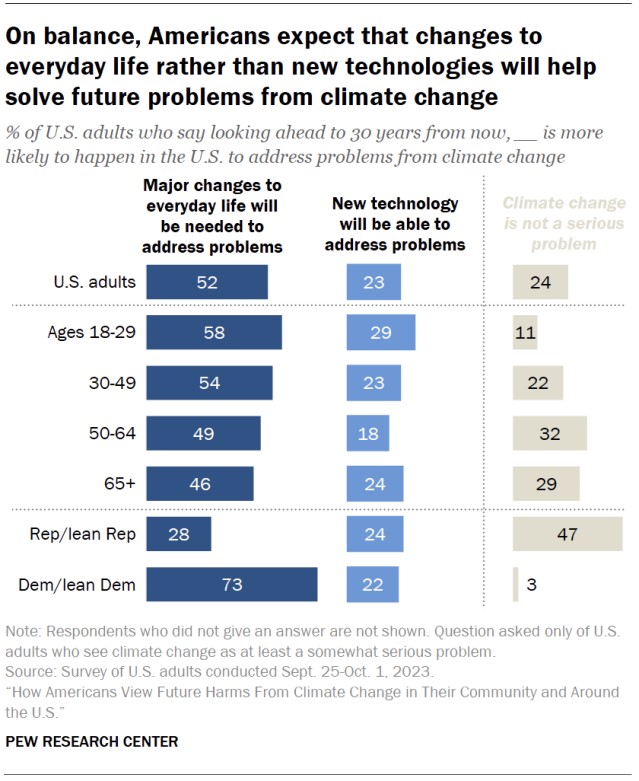
Nearly half of Americans think individuals can’t make much of an impact on climate change, according to a new survey from Pew Research Center – here’s why.
Americans and impact on climate change
Pew surveyed 8,842 adults in the US between September 25 and October 1, 2023, about their opinions on climate change. The survey asked Americans who said they see climate change as at least a somewhat serious problem which groups they think can do “a lot” to combat climate change. (The deniers who said climate change is not too serious or not a problem – 24% – weren’t asked that particular question.)

Fifty-five percent of respondents answered that the energy industry can make a big impact, and 52% think large businesses and corporations can mitigate climate change. Then came the belief that the federal government (47%) and cities and communities (40%) can make a difference.
But only 27% of US adults polled felt that individual Americans’ efforts can help “a lot.” Thirty-six percent said that individuals’ efforts can do “a little” to impact climate change, and 13% said “not much.”
That means just under half – 49% – of Americans think individuals can do a little, or not much, to combat climate change. Then add in the 24% group who think climate change isn’t real, and you have a majority.

Yet when asked to look ahead to 30 years from now, 52% felt that “major changes” to everyday life will be needed to address the problems caused by climate change. (Again, the climate change deniers weren’t asked this question.)
Electrek’s Take
So let’s get this straight.
More than half of Americans think that they – or rather, their kids and grandkids – are going to have to make major changes to everyday life to address the problems caused by climate change in 2053.
But just under half also feel there’s nothing more than at least “a little” that individual people can do about climate change right now.
Let’s also presume that those polled were also thinking about themselves when they answered this question about individuals. So what’s with this seemingly selfish viewpoint?
A lot of psychology comes into play. Psychology professor Art Markman reported in 2018 for Harvard Business Review that acting on climate change means “a trade-off between short-term and long-term benefits, which is the hardest trade-off for people to make.”
Markman also notes that “people conceptualize things that are psychologically distant from them (in time, space, or social distance) more abstractly than things that are psychologically close.” In other words, climate change will eventually be someone else’s problem because it’s not a concrete thing now.
How many of your friends and family say that they believe in climate change and that “we” have to do something, yet when you ask them when they’re going to get rooftop solar or switch to driving an electric vehicle, they look at you like you have three heads?
I find it’s always the same response – a startled and then confused and reflective expression, followed by a mumbled excuse about [can’t afford an EV/not enough sunlight for rooftop solar/aren’t enough EV chargers/you fill in the blank with the excuses you’ve heard].
It’s at this point in the conversation that the carrot works better than the stick. Instead of berating your American cousin about how he needs to fight climate change by saving the skinny polar bear standing on the tiny ice island in that photo, tell him how much money you’ve saved since you switched to driving an EV, and show him the numbers.
That helps to bring the “conceptual” catastrophe of future global warming back to How You Can Make a Difference Right Now. And it really doesn’t matter what reason encourages individuals to drive electric and adopt rooftop solar Right Now, as long as it does.
Top comment by Udi
I think that climate change is the top issue we need to handle. I even drive an electric car. But as individual, I believe that the only significant action I can do to fight climate change is to vote for politicians that would steer the government actions in the right direction.
The reason is that I have very little control over my carbon footprint. Even if I buy an apple at the grocery store, there is no way for me to know what is the carbon cost of this apple.
I do try to minimize my use of plastics, electricity, water, etc. But I do not fool myself into thinking that it makes a big difference.
There’s only one way to eat an elephant – a bite at a time. (Thanks, Desmond Tutu.)
Read more: Here’s how much money you’ll get with the Inflation Reduction Act
To limit power outages and make your home more resilient, consider going solar with a battery storage system. In order to find a trusted, reliable solar installer near you that offers competitive pricing, check out EnergySage, a free service that makes it easy for you to go solar. They have hundreds of pre-vetted solar installers competing for your business, ensuring you get high-quality solutions and save 20-30% compared to going it alone. Plus, it’s free to use, and you won’t get sales calls until you select an installer and share your phone number with them.
Your personalized solar quotes are easy to compare online, and you’ll get access to unbiased Energy Advisers to help you every step of the way. Get started here. – ad*
FTC: We use income earning auto affiliate links. More.





Comments